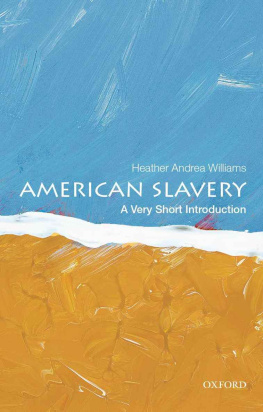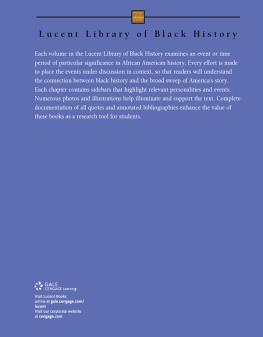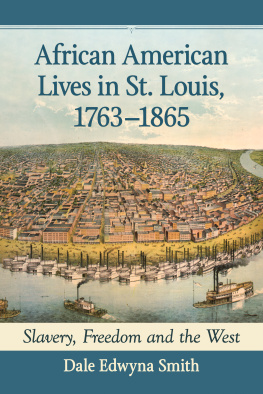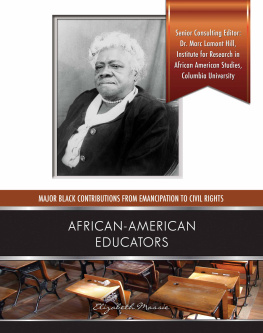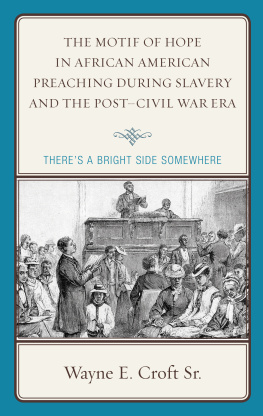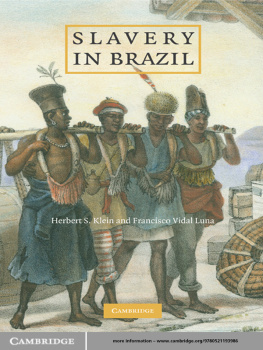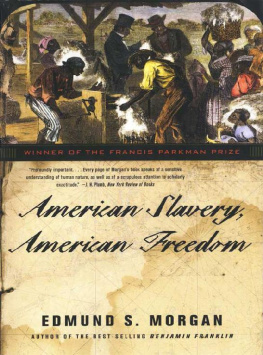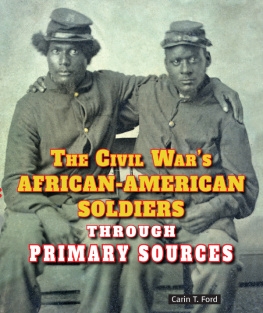2005 The University of North Carolina Press
All rights reserved
Manufactured in the United States of America
Designed by Jacquline Johnson
Set in Bembo
by Keystone Typesetting, Inc.
The paper in this book meets the guidelines for permanence and durability of the Committee on Production Guidelines for Book Longevity of the Council on Library Resources.
Parts of this book have been reprinted with permission in revised form from the following works: Southern Manhood: Perspectives on Masculinity in the Old South, edited by Craig Thompson Friend and Lorri Glover, 196219 (Athens: University of Georgia Press, 2004); and Clothing Themselves in Intelligence: The Freedpeople, Schooling, and Northern Teachers, 18611871, Journal of African American History 87 (Fall 2002): 37290.
Library of Congress Cataloging-in-Publication Data
Williams, Heather Andrea.
Self-taught : African American education in slavery and freedom /
Heather Andrea Williams.
p. cm. (The John Hope Franklin series in African American history
and culture)
Includes bibliographical references and index.
ISBN 0-8078-2920-x (alk. paper)
1. African AmericansEducationSouthern StatesHistory.
2. SlavesEducationSouthern StatesHistory. 3. Freedmen
EducationSouthern StatesHistory. 4. Self-cultureSouthern
StatesHistory. 5. LiteracySouthern StatesHistory.
6. EducationSocial aspectsSouthern StatesHistory. 7. Slavery
Southern StatesHistory. 8. Southern StatesRace relations. I. Title.
II. Series.
LC2802.S9W55 2004
370'.89'96073075dc22 2004022755
09 08 07 06 05 5 4 3 2 1
ACKNOWLEDGMENTS
This book grew out of a dissertation, and Glenda Gilmore was the ideal dissertation director. She was thoroughly supportive, getting excited with me when I made new discoveries, pushing me to explore further. She helped me to grow as a historian and writer and continues to be an enthusiastic and insightful reader of my work. I am grateful to her beyond words. The late John Blassingame ignited my love of the discipline of history in his courses on slavery and the Civil War, and I continue to consult his copious writing on African American history. I am thankful, too, to Matthew Jacobson and David Brion Davis, who taught and inspired me from the very beginning of this project. Knowing that Matt is eager to teach my book has made me work even harder at it.
Several other historians have been important to my growth over the years. I would like to thank John Demos, whose class on narrative history made a difference, and Jennifer Baszile, whose comments have helped me to better clarify and articulate my own thinking.
While writing the last chapter of my dissertation, I began to realize that the University of North Carolina Press had published some of the most important books on African American education in the twentieth century. My first meeting with Kate Torrey confirmed my interest in working with the Press: Kate understood the importance of this history and appreciated the way that I told the story. Chuck Grench has made the process of publishing this book a pleasant experience from the start. He very patiently answered my many questions and gave me encouraging feedback. Working with Chuck has been all the more satisfying because of our mutual love of quilts. Bethany Johnson is a brilliant copyeditor. She has what is to me an astounding ability to pay attention to the most minute details while remaining completely engaged with the narrative. I am immensely grateful to the outside readers for the Press, James Anderson and Ira Berlin. Their comments and suggestions were invaluable to me as I revised the manuscript.
I received a great deal of support both during graduate school and after to make this work possible. Most recently, a Woodrow Wilson Postdoctoral Fellowship in the Kahn Liberal Arts Institute at Smith College gave me the time to revise the manuscript. I would like to thank especially Marjorie Senechal, Ren Heavlow, and Cyndee Button of the Kahn Institute; Ann Ferguson and Kevin Quashie of the Afro-American Studies Department; and Mendenhall Fellow Crystal Lewis-Colman. I also learned a great deal from the students in my courses on race, slavery, and emancipation. Most of all, I thank my colleague and neighbor Tracy Vaughn for her friendship during my time in Northampton.
I would like to thank the Yale University Graduate School for accepting and offering financial assistance to someone who had already had one career. It meant a great deal to me. I am extremely grateful to the Ford Foundation for the Predoctoral and Dissertation Fellowships that enabled me to research and write almost without interruption. Receiving the Spencer Dissertation Fellowship was a great honor that came with the added benefit of introducing me to scholars working on a wide range of educational issues. I also received a number of research fellowships. I would first and particularly like to thank the Institute for the Advanced Study of Religion at Yale for the summer research fellowship that enabled me to travel to archives in New Orleans, Louisiana, and Richmond, Indiana. I am thankful also to the Oberlin College Archives for the Frederick Artz Research Grant, to Yale University for the John F. Enders Research Fellowship, and to the North Caroliniana Society for the Archie K. Davis Fellowship that enabled me to use the resources at the University of North Carolina at Chapel Hill.
Numerous archivists and librarians have been extremely helpful to me. First, I would like to thank Brenda Square at the Amistad Research Center in New Orleans. Her excitement about my project gave me extra energy for the weeks spent in the archives. Reginald Washington and Michael Musick at the National Archives Research Administration patiently helped me to navigate through Military Service Records and Regimental Books. Ronald Baumann, the Oberlin College archivist, was also very kind and helpful, as were Leigh Troutman at the Kentucky Department for Libraries and Archives and Teresa Roane at the Valentine Richmond History Center. I am thankful to archivists and librarians at the Quaker Collection at Earlham College in Indiana, the Schomburg Center for Research in Black Culture in New York City; the Massachusetts Historical Society in Boston; the Connecticut Historical Society in Hartford; the New Orleans Public Library; the Memphis/Shelby County Public Library; the Tulane University Library; the Filson Society in Louisville, Kentucky; the State Historical Society of Missouri in Columbia, Missouri; the Hampton University Archives in Hampton, Virginia; the Beinecke Rare Books and Manuscripts Library and the Yale University Manuscripts and Archives in New Haven, Connecticut. I would also like to thank Ira Berlin and Leslie Rowland for making the materials of the Freedmen and Southern Society Project at the University of Maryland available to me. I would like to thank Nancy Godleski, Librarian for History and American Studies at Sterling Memorial Library at Yale, for all her support. Finally, I am grateful to the staff of the Cross Campus Library at Yale for always making me feel at home.
I was the beneficiary of a tremendous system of support among my colleagues in the Yale Graduate School. Members of our quilting group who have become intellectual partners and family include Qiana Whitted, Franoise Hamlin, Leigh Raiford, Lisa McGill, Brian Herrera, Catherine Whalen, Kimberly Brown, and Danielle Elliott. My dissertation group, Qiana, Franoise, Leigh, Eric Grant, and Cheryl Finley, read my work and offered much appreciated support. Lisa McGill left footsteps for me to follow all along the way. Sonya Winton was a good study partner who paced me during the last months of writing. Qiana Whitted and I became compatriots at the very beginning of the graduate school experience; her friendship continues to mean the world to me. Thanks to Victorine Shepard, Registrar of the American Studies Department, for her strength and warmth and integrity.


